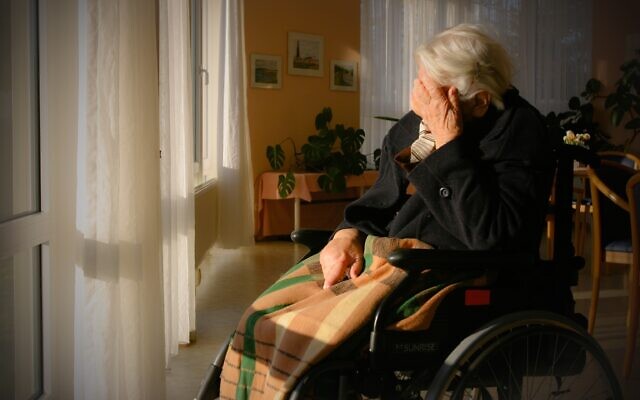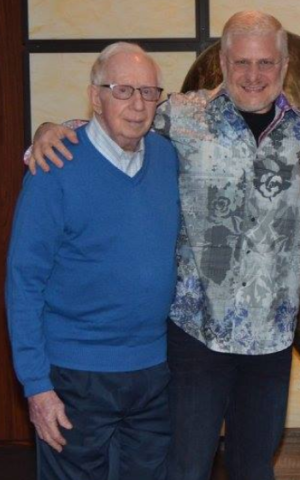COVID Brings More Loneliness to Seniors
Stress of living with more isolation during the pandemic can affect physical and emotional life.

Morris Miehl was already beginning to have serious problems with his chronic heart condition when the pandemic was first felt in March. His life at Sunrise at Huntcliff Summit, the independent living community in Sandy Springs, had radically changed. He and over 300 other residents were confined to their apartments, meals were delivered to their doors, and visits by family and friends were halted.
The most meaningful direct contact many people had each day was the visit they received from someone who checked their temperature and asked whether they were experiencing any symptoms of the COVID-19 disease.

Still, when I interviewed him for the Atlanta Jewish Times a couple of weeks into the lockdown, he was trying to make the most of a difficult situation. It was, for the retired anesthesiologist, “like living in a cocoon.”
“I am visiting people from my past. I must have spent three hours on the phone today talking to a very close friend from where I used to practice medicine.
And I have my computer to stay in touch with the family.”
But for Miehl, who had lived in the building for over 20 years and prided himself on his active lifestyle and sharp mental focus, the isolation that resulted from the pandemic had an almost immediate effect.
His son, Brad, who lives in Atlanta and had a close relationship with his father, had noticed a sharp decline in his father’s health after being shut in. He was increasingly having trouble with his balance and he fell more often. Brad Miehl remembers that his father began to lose the psychological edge that he had once cherished.
“The isolation absolutely affected his health in a serious way. I mean psychologically and physically it affected his health in multiple ways, I do believe, definitely exacerbated any condition that he had.”
Two months after Morris Miehl assured me that he was successfully coping with the stresses of his new lifestyle, he died. He was just a few days short of his 89th birthday.
One of his favorite charities was a fund that he had established at Jewish Family & Career Services to help provide home health care for older adults who couldn’t afford it.
Since last March, the aid that JF&CS provides to seniors impacted by the effects of the pandemic has been substantial. Debbie Dooley, a geriatric care manager at the agency, has seen a rapid escalation in the services it offers to seniors.
“People need so much support right now that our care management and all of our Aviv Older Adult Services at JF&CS are bulging at the seams because people really are seeking out support for their elders. Especially for people who don’t drive and aren’t particularly technically savvy with their computers, this has been a hard time in terms of their degree of isolation.”
She points out that the social service agency is adding more professional staff, but is challenged to keep up with demand for help from families who are not able to provide all the assistance that older family members need.
According to Dooley, the agency has added extra online groups, expanded contact via phone calls and volunteer relationships through the volunteer match program, and continued ongoing services to Holocaust survivors.

“We’re struggling to keep up with capacity. People just really need support. People are not able to interface with their elders in the way that feels right to them. And it’s always a struggle. But right now, folks are really having to relinquish a lot to trust and I’m just hoping that the service providers that are supporting their elders, wherever they are, are doing a good job.”
For Tilda Cohen, who is in her late 80s and is a part of the JF&CS support program, life is increasingly difficult. Last month when her granddaughter was married in Atlanta, there were only 15 guests allowed to attend, there were no hugs, and the masks that people wore made it difficult to hear many of them. She sat alone at the reception to maintain social distance.
It was a dispiriting experience for Cohen, made all the more painful by the thoughts of when her life will return to normal, or whether this is how she will live out her remaining years.
“It’s the uncertainty, the uncertainty. And I’ve been talking to myself. You know, I don’t have long. I’m 87. And so you realize time is getting shorter. Some days it’s okay. Sometimes you get down in the dumps.”
Dooley, who just turned 69 and shares some of the anxiety of aging during the pandemic, remembers a widower who attended one of her support groups while still mourning the recent death of a seriously ill spouse.
He had said that while his wife didn’t die of the COVID-19 virus, she may have died because of it, and his words still resonate with Dooley.
“Each one of us has just one body. And whatever impacts your body impacts all of your body, including what goes on in your head and your heart and all of it. I can’t say I can analyze any more than that.”



comments